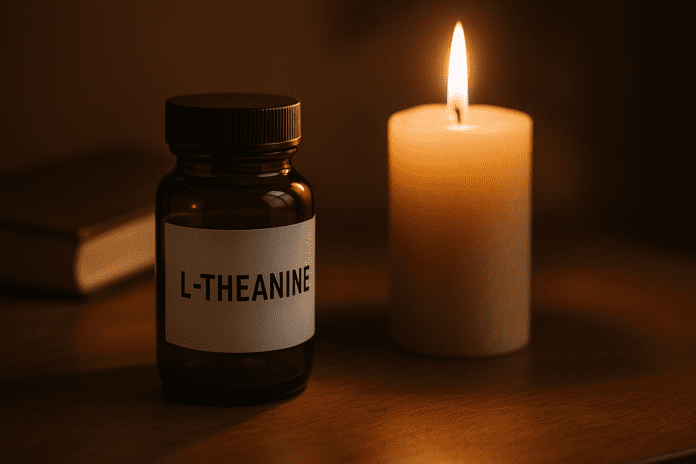The Synergistic Duo of L-Theanine and Caffeine
The modern world places increasing cognitive demands on individuals, making mental clarity and sustained focus essential. As a result, many people turn to nootropic combinations to optimize brain function without the jittery side effects commonly associated with stimulants. Among these, the pairing of L-theanine and caffeine has gained prominence for its unique ability to enhance focus while promoting a state of calm alertness. Unlike other nootropic stacks that can overstimulate the central nervous system or create dependency, L-theanine and caffeine together offer a balanced approach to boosting attention, memory, and cognitive resilience over time.
You may also like: Best Rated Nootropics for Brain Health: Top Supplements to Enhance Focus, Memory, and Longevity
Found naturally in tea leaves, L-theanine is an amino acid known for its anxiolytic (anti-anxiety) properties. It promotes relaxation without sedation by increasing levels of GABA, dopamine, and serotonin in the brain. Caffeine, on the other hand, is a well-established stimulant that enhances alertness and attention by blocking adenosine receptors and increasing dopamine activity. When consumed individually, each has distinct effects. However, when combined in the right caffeine theanine ratio, these compounds exhibit a powerful synergy that enhances cognitive performance while minimizing side effects such as nervousness, restlessness, and energy crashes.
This combination has captured the interest of biohackers, students, and professionals alike, many of whom use coffee with L-theanine as a strategic tool to stay mentally sharp during extended periods of concentration. Yet, beyond short-term focus, emerging research suggests that this nootropic duo may also support brain longevity and cognitive health in aging populations. Understanding how to use L-theanine and caffeine together not only improves day-to-day productivity but may also contribute to long-term brain health through its neuroprotective mechanisms.
How L-Theanine and Caffeine Interact in the Brain
To fully appreciate the benefits of theanine coffee or other L-theanine caffeine combinations, it’s important to explore how these substances interact within the brain’s neurochemical pathways. Caffeine primarily exerts its effects by antagonizing adenosine receptors, which suppresses the signal that tells the body it’s time to relax or sleep. This action increases wakefulness, attention, and motivation. However, it also stimulates the release of adrenaline, leading to side effects such as increased heart rate, elevated cortisol levels, and the jitteriness that many coffee drinkers experience after a strong cup.
L-theanine, by contrast, modulates neurotransmitters in a way that supports calm and focused mental states. It enhances alpha brain wave activity—commonly associated with meditation and deep concentration—while increasing the production of GABA, serotonin, and dopamine. These neurotransmitters play crucial roles in mood regulation, learning, memory, and sleep quality. When L-theanine and caffeine are consumed together, the L-theanine offsets caffeine’s excitatory effects by reducing stress responses without dulling alertness. The result is a smooth, sustained sense of energy and focus, often described as “clean” or “non-jittery” stimulation.
Moreover, this pairing influences cognitive control networks in the prefrontal cortex, enhancing executive functions such as attention switching, task performance, and working memory. Functional MRI studies have shown increased connectivity between brain regions involved in sustained attention when L-theanine and caffeine are co-administered. The exact mechanisms remain under investigation, but the combination appears to mitigate caffeine’s tendency to overstimulate the nervous system while reinforcing its positive cognitive effects.
Determining the Ideal L-Theanine Caffeine Ratio
One of the most frequently asked questions regarding this nootropic duo is what constitutes the best L-theanine caffeine ratio for optimal performance and long-term brain health. While individual responses vary depending on genetics, body weight, sensitivity to stimulants, and baseline anxiety levels, scientific and anecdotal evidence consistently points to a balanced ratio between 1:1 and 2:1 (L-theanine to caffeine) as the most effective.
In practical terms, this often translates to combining 100 mg of caffeine with 100–200 mg of L-theanine. This ratio has been widely studied and appears to offer the greatest benefits for cognitive enhancement without unwanted side effects. A 1:1 ratio is ideal for individuals who tolerate caffeine well and simply want to soften its stimulating edge, while a 2:1 ratio may be preferable for those more sensitive to caffeine or prone to anxiety.
Some research suggests that a slightly higher dose of L-theanine relative to caffeine further reduces heart rate and blood pressure spikes typically associated with caffeine intake. This makes the 2:1 ratio particularly attractive for older adults or individuals with preexisting cardiovascular conditions who still want the cognitive benefits of caffeine without undue stress on the nervous system. As always, starting with the lowest effective dose and adjusting gradually can help determine the most personalized and effective L-theanine caffeine ratio for your needs.
L-Theanine and Caffeine Benefits for Focus and Productivity
One of the most celebrated effects of using L-theanine and caffeine together is the improvement in mental performance, especially under pressure. In multiple clinical trials, this combination has been shown to improve attention switching, reaction time, and working memory—all critical components of productivity and high-level cognitive functioning. Whether tackling a demanding work project, studying for an exam, or managing multitasking environments, theanine coffee or a well-formulated supplement stack can provide a noticeable edge.
Unlike traditional stimulants, which often lead to an energy crash after the initial burst of focus, combining L-theanine and caffeine leads to a smoother, more sustained mental state. Users commonly report increased mental endurance, enhanced creativity, and better information retention when using the combination. This is particularly valuable for individuals in intellectually demanding professions, where cognitive fatigue and decision fatigue can impair performance throughout the day.
Moreover, because L-theanine promotes alpha wave activity, it helps reduce the inner mental noise that often interferes with concentration. This makes the pairing especially useful for individuals with attention difficulties or those prone to anxiety, as it allows them to remain calm while fully engaged in a task. With the right caffeine theanine ratio, it is possible to achieve deep focus without the typical drawbacks associated with stimulants, making this duo a go-to tool for cognitive enhancement with minimal risk.

Personalized Nootropics: Genetics and Individual Response to Caffeine and Theanine
Not everyone responds to caffeine and L-theanine in the same way. Your genetic makeup—particularly genes related to caffeine metabolism and neurotransmitter receptors—plays a pivotal role in determining the ideal theanine caffeine ratio for you.
For example, variations in the CYP1A2 gene influence how quickly you metabolize caffeine. Fast metabolizers break down caffeine efficiently and experience longer-lasting focus without sleep disturbances. Slow metabolizers, on the other hand, are more likely to experience side effects such as anxiety, palpitations, and disrupted sleep—even at low doses. These individuals may benefit from a 2:1 or even 3:1 L-theanine caffeine ratio to buffer against overstimulation.
Additionally, the COMT gene, which regulates dopamine metabolism, affects how caffeine impacts mood and motivation. Those with the “warrior” variant of COMT may need higher dopamine stimulation to stay engaged, while “worriers” tend to have naturally higher dopamine tone and are more sensitive to stress—again calling for more L-theanine to balance the response.
Recognizing these differences allows for a more bioindividual approach to nootropic stacking. Rather than relying on generic recommendations, genetic testing or even guided trial and error can help determine the most effective and sustainable way to use L-theanine and caffeine together for both performance and longevity.
L-Theanine and Caffeine in Mental Health Contexts: From ADHD to Depression
New research is exploring how this natural nootropic pairing might benefit individuals with mental health disorders, including attention-deficit hyperactivity disorder (ADHD) and depressive symptoms. While not a replacement for psychiatric treatment, L-theanine and caffeine may offer supportive cognitive benefits in specific cases.
For individuals with ADHD, traditional stimulant medications like methylphenidate or amphetamines can cause side effects such as appetite suppression, sleep disturbances, or emotional blunting. The combination of caffeine and L-theanine offers a gentler cognitive enhancement strategy. Caffeine supports attention and impulse control by increasing dopamine availability in the prefrontal cortex. L-theanine counteracts the anxiety and irritability that can arise from increased stimulation. Some small studies and case reports suggest improved executive functioning and better task persistence when this pairing is used as a supplementary or alternative option.
In individuals with mild to moderate depression, L-theanine’s ability to increase serotonin and dopamine levels—alongside caffeine’s energy-boosting effects—can promote increased motivation, focus, and an improved sense of well-being. As always, medical supervision is essential, especially when psychiatric symptoms are present. However, the potential of this natural combination in mental health support continues to gain interest among integrative psychiatrists and functional medicine practitioners.
The Role of Coffee with L-Theanine in Cognitive Longevity
Beyond its short-term performance benefits, the combination of coffee with L-theanine may also offer neuroprotective effects that support brain longevity. Chronic stress, inflammation, and oxidative damage are key contributors to cognitive decline and age-related neurological conditions. Fortunately, both L-theanine and caffeine possess antioxidant and anti-inflammatory properties that may help mitigate these effects over time.
L-theanine has been shown to protect brain cells against glutamate-induced excitotoxicity, a process implicated in neurodegenerative diseases such as Alzheimer’s and Parkinson’s. It also promotes the expression of brain-derived neurotrophic factor (BDNF), a protein essential for the growth and maintenance of healthy neurons. Caffeine, meanwhile, has been linked to a reduced risk of age-related cognitive impairment in several population-based studies, likely due to its ability to enhance mitochondrial function, increase cerebral blood flow, and modulate inflammatory pathways in the brain.
When consumed together, L-theanine and caffeine may amplify these protective effects. Their synergistic action not only improves acute cognitive performance but also fosters an internal environment conducive to long-term neural health. This dual-action approach—enhancing both performance and resilience—makes them an ideal addition to any anti-aging or cognitive longevity regimen. As part of a comprehensive brain health strategy, the right L-theanine caffeine ratio can be a cornerstone for preserving mental agility well into older adulthood.
Understanding the Science Behind Theanine Coffee
The popularity of theanine coffee has grown in part due to the increasing availability of specialty products and supplements designed to deliver an optimized blend of these compounds. However, the science behind the efficacy of theanine coffee lies in the pharmacokinetics—how the body absorbs, distributes, metabolizes, and excretes each compound.
Caffeine is rapidly absorbed into the bloodstream, reaching peak plasma levels within 30–60 minutes. Its effects can last for up to six hours, depending on an individual’s metabolism and liver enzyme activity. L-theanine, on the other hand, has a slightly slower absorption profile but remains active for a similar duration, allowing it to modulate caffeine’s effects throughout its activity window. When combined in a single beverage or capsule, L-theanine and caffeine work in tandem to deliver a stable, prolonged cognitive effect with a more predictable onset and offset.
Furthermore, many people find that adding L-theanine to coffee improves the sensory experience as well. The amino acid can reduce coffee-induced palpitations, improve mood stability, and even lessen gastrointestinal discomfort in sensitive individuals. This makes theanine coffee not just a performance enhancer, but a more enjoyable and sustainable alternative to traditional caffeine consumption, particularly for those seeking a healthier relationship with stimulants.

Using L-Theanine and Caffeine for Brain Health at Every Age
Whether you’re a college student navigating the demands of academic life or an aging adult focused on maintaining cognitive clarity, the benefits of L-theanine and caffeine together can be harnessed at every life stage. In younger populations, the combination supports academic performance, information processing, and test-taking confidence. For working professionals, it enhances strategic thinking, task execution, and meeting stamina. In older adults, it may help protect against mild cognitive impairment while supporting energy and mood.
Importantly, the combination supports brain health not by overstimulation but through modulation. This gentle balancing act reduces stress on the central nervous system and supports neurotransmitter equilibrium, both of which are crucial for long-term brain resilience. Furthermore, because the pairing doesn’t carry the dependency risks associated with more aggressive stimulants, it can be safely incorporated into daily routines with minimal risk of tolerance or withdrawal.
Parents of teens, professionals managing burnout, and caregivers seeking safe cognitive enhancers for loved ones with early memory decline can all benefit from understanding the nuances of the best caffeine theanine ratio. In every context, the goal is the same: to enhance brain function today while laying the groundwork for neurological health in the future.
Practical Advice for Integrating L-Theanine and Caffeine
Incorporating L-theanine and caffeine into your daily routine can be simple and highly customizable. For many, starting the day with coffee enhanced by L-theanine is an easy way to experience smoother energy and clearer thinking. Some prefer to use capsules or powder blends that allow precise control over dosing. Others may experiment with different timing strategies, such as using the combo in the early morning to support all-day focus, or in the mid-afternoon to combat the post-lunch energy slump without risking sleep disruption.
For those who are caffeine-sensitive, starting with a lower dose of caffeine (e.g., 50 mg) and pairing it with 100–200 mg of L-theanine can provide a gentle but noticeable lift. As tolerance builds or needs evolve, doses can be adjusted within a safe range. It’s important to consider the source of caffeine as well—coffee, green tea, matcha, and guarana all contain caffeine but vary in additional compounds that influence absorption and effect.
Keep in mind that hydration, sleep quality, and overall lifestyle will influence how effectively your body utilizes these compounds. To maximize the benefits of any L-theanine caffeine ratio, support your brain with adequate rest, physical movement, and nutrient-rich foods. Supplements should always complement, not replace, a healthy lifestyle foundation.
Frequently Asked Questions: Advanced Insights on L-Theanine and Caffeine Together for Brain Health, Focus, and Longevity
1. Can L-theanine and caffeine help support cognitive performance during high-stress periods like exams or tight work deadlines?
Yes, using L-theanine and caffeine together may be especially effective during periods of intense cognitive demand. The combination doesn’t just improve focus—it modulates your brain’s stress response, helping you stay mentally sharp while maintaining composure under pressure. When the brain is overwhelmed by cortisol and adrenaline, caffeine alone may backfire by amplifying jitteriness or decision fatigue. However, adding L-theanine to caffeine balances this stimulation by promoting alpha brain wave activity, which supports calm and focused concentration. Whether you’re preparing for a high-stakes academic exam or facing multiple back-to-back meetings, dialing in the right l theanine caffeine ratio can help sustain productivity without burnout.
2. Is there a difference between drinking theanine coffee and taking L-theanine with caffeine in capsule form?
Absolutely. The delivery method of L-theanine and caffeine matters more than most people realize. When you consume coffee with L-theanine in beverage form, the absorption rate is influenced by factors such as food in the stomach, liquid temperature, and digestion time. Capsules, on the other hand, provide a more precise and often faster-acting experience, especially if taken on an empty stomach. Theanine coffee tends to produce a smoother onset, making it ideal for those easing into the day, while capsules are more useful for timed, targeted focus—like just before a presentation. Understanding how your body metabolizes each form helps determine the most effective caffeine theanine ratio for your lifestyle.
3. Can L-theanine and caffeine benefits extend to creative work, not just analytical tasks?
Yes, and this is one of the more underappreciated applications of this nootropic pair. Creativity requires both divergent thinking and the ability to enter a flow state—conditions often disrupted by overstimulation. The L-theanine and caffeine benefits extend beyond raw focus to include enhanced mood regulation and smoother idea generation. Many designers, writers, and musicians find that theanine coffee supports prolonged periods of deep work without the inner agitation that traditional stimulants often trigger. When you find the right caffeine theanine ratio for your brain, you may notice more fluid transitions between creative problem-solving and analytical execution, which is invaluable for multidisciplinary tasks.
4. Is there any evidence that theanine coffee can influence social performance or public speaking confidence?
Interestingly, yes. While not a replacement for behavioral strategies or experience, the L-theanine caffeine combination may provide subtle support for social and performance-based stress. L-theanine promotes calmness without sedation, which can blunt the edge of performance anxiety. When paired with caffeine, this balance creates mental alertness that doesn’t tip into overstimulation—a common challenge for public speakers or professionals engaging in high-stakes meetings. Some speakers use a 2:1 l theanine caffeine ratio before stepping on stage to support clear articulation and reduce physiological symptoms like shaky hands or rapid heart rate. It’s a promising approach for those seeking a natural alternative to beta blockers or anxiety medications for mild performance stress.
5. How do long-term users of L-theanine and caffeine avoid building tolerance to its effects?
Sustained benefits from L-theanine and caffeine together can be maintained with smart cycling strategies and lifestyle integration. Unlike stronger stimulants, the tolerance curve for this combination is mild, but regular use without breaks may diminish its acute focus-enhancing impact. Many experienced users follow a schedule where they take breaks one or two days a week or shift to lower doses periodically. Some also reserve the combination for cognitively demanding days, using it as a tool rather than a daily ritual. Because the l theanine caffeine ratio can be fine-tuned, adjusting your intake based on sleep, diet, and workload ensures the brain remains responsive and avoids overreliance on external stimulation.
6. Can caffeine and L-theanine be paired with adaptogens or other herbal supplements for added benefits?
Yes, stacking theanine coffee or capsules with other botanicals like Rhodiola rosea, ashwagandha, or bacopa monnieri is a growing trend in functional medicine. These adaptogens help regulate cortisol, support memory, and improve resilience to chronic stress—making them excellent allies in long-term brain health strategies. When paired with the right caffeine theanine ratio, these herbs can enhance the stack’s effectiveness by supporting mitochondrial health and neuroplasticity. For example, Rhodiola can add physical endurance to the mix, while bacopa amplifies memory retention. Always start with low doses when introducing new components to your stack and consult a healthcare provider, especially if you’re managing health conditions or taking medications.
7. Are there any gender-specific considerations in how men and women respond to L-theanine and caffeine together?
Emerging evidence suggests there may be subtle gender-based differences in how individuals metabolize and respond to caffeine and L-theanine. For example, hormonal fluctuations throughout the menstrual cycle can affect caffeine sensitivity, with some women experiencing heightened anxiety during the luteal phase. In such cases, increasing the L-theanine portion of the l theanine caffeine ratio can help buffer against overstimulation. Additionally, women with slower caffeine metabolism (often due to CYP1A2 genetic variants) may benefit from taking theanine coffee earlier in the day to avoid sleep disturbances. Men, on average, may tolerate slightly higher caffeine doses, but individual variability remains significant across all genders.
8. How might L-theanine and caffeine affect older adults differently compared to younger users?
Age-related changes in neurotransmitter levels, circulation, and metabolism can alter how older adults experience L-theanine and caffeine benefits. While younger users might focus on productivity and performance, seniors may prioritize memory, emotional stability, and brain aging prevention. Older adults may also metabolize caffeine more slowly, increasing the risk of sleep disruption or cardiovascular sensitivity. Choosing a lower caffeine dose (e.g., 50–75 mg) with a higher L-theanine content—say, a 2:1 or 3:1 caffeine theanine ratio—can help maintain mental sharpness without undue stimulation. In this context, coffee with L-theanine can be a gentle cognitive tonic that supports clarity and mood while preserving long-term neurological health.
9. Can L-theanine and caffeine be helpful for shift workers or people with irregular sleep schedules?
Yes, and this application is becoming increasingly important in today’s 24/7 work culture. Shift workers often experience disrupted circadian rhythms and struggle with both alertness and sleep quality. Using L-theanine and caffeine together during early shifts can help increase wakefulness while minimizing the crash that caffeine alone might cause. Moreover, because L-theanine enhances relaxation, it may make it easier to wind down after a shift, especially if a separate dose is taken later without caffeine. Adjusting the l theanine caffeine ratio based on work hours, sleep patterns, and recovery needs allows shift workers to use this nootropic stack without compounding their fatigue or overstressing the nervous system.
10. What innovations are emerging in the functional beverage and supplement space around L-theanine and caffeine?
The popularity of theanine coffee has led to a wave of innovation in both beverage and supplement industries. Ready-to-drink cold brews with built-in nootropic stacks, functional powders with tailored caffeine theanine ratios, and even time-release capsules are becoming mainstream. Some brands now include complementary ingredients like magnesium L-threonate or lion’s mane for deeper brain health benefits. Meanwhile, AI-driven personalization tools are helping users determine the most effective ratios and timings based on sleep data, mood tracking, and genetic insights. These innovations are pushing the boundaries of how L-theanine and caffeine benefits can be accessed—not just for acute performance, but for holistic brain wellness and longevity.

Conclusion: Optimizing the L-Theanine and Caffeine Ratio for a Sharper, Calmer Mind
As research continues to explore the intersections of performance, mood, and cognitive longevity, the combination of L-theanine and caffeine stands out as a scientifically validated, highly effective strategy for enhancing mental function without overstimulation. By understanding how these compounds work together and choosing the best L-theanine caffeine ratio for your individual needs, you can unlock a state of calm focus that not only improves your daily productivity but also supports your brain’s long-term resilience.
Whether you choose coffee with L-theanine in the morning, a midday nootropic stack, or a supplement tailored to your personal brain health goals, the key is consistency and intentionality. When used wisely, this combination offers one of the most accessible and impactful ways to align energy, clarity, and calm—hallmarks of a brain that is not only high-performing but also protected for the years ahead. In a world filled with distractions and cognitive overload, L-theanine and caffeine together provide a rare balance: stimulation without strain, energy without anxiety, and alertness with ease.
natural nootropics for focus, brain-boosting supplements, cognitive enhancers for productivity, adaptogens for stress, mental clarity strategies, neuroprotective nutrition, smart drug alternatives, natural remedies for anxiety, alpha brain wave boosters, caffeine alternatives for focus, functional beverages for energy, holistic brain health support, memory and concentration aids, focus without jitters, brain longevity techniques, natural ways to reduce brain fog, stress and focus balance, plant-based cognitive support, mood and attention supplements, personalized nootropic stacks
Further Reading:
The perfect blend: l-theanine and caffeine for caffeine jitters
10 Health Benefits of L-Theanine Supplements (Side Effects + Dosage)
Combined Effects of L-Theanine and Caffeine: Focus, Cognition, and Mood
Disclaimer
The information contained in this article is provided for general informational purposes only and is not intended to serve as medical, legal, or professional advice. While Health11News strives to present accurate, up-to-date, and reliable content, no warranty or guarantee, expressed or implied, is made regarding the completeness, accuracy, or adequacy of the information provided. Readers are strongly advised to seek the guidance of a qualified healthcare provider or other relevant professionals before acting on any information contained in this article. Health11News, its authors, editors, and contributors expressly disclaim any liability for any damages, losses, or consequences arising directly or indirectly from the use, interpretation, or reliance on any information presented herein. The views and opinions expressed in this article are those of the author(s) and do not necessarily reflect the official policies or positions of Health11News.


